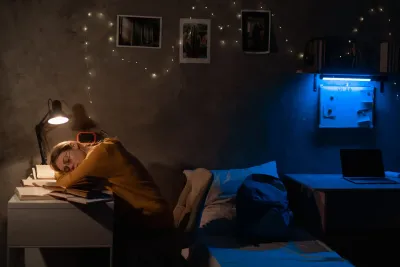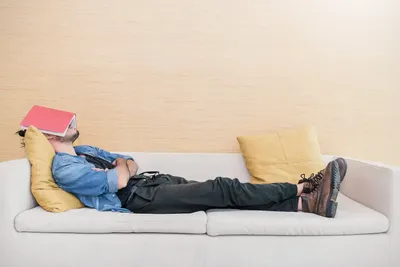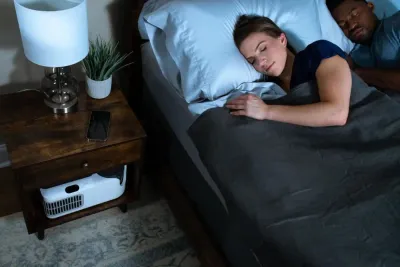How College Students Can Sleep Better in Their Dorm Room
Chilipad Editorial Team • Jul 30, 2024

Key Takeaways
Sleeping well in a dorm room is possible with a few smart setup changes, simple tools, and routines that help your brain tune out the chaos and wind down.
- Dorm beds may be basic, but a mattress topper and blackout curtains can make your sleep setup feel far more comfortable and controlled.
- Noise is one of the biggest sleep killers in dorms. White noise machines, noise-canceling earbuds, or even a fan can help mask disruptive sounds.
- Temperature control is often out of your hands in dorms, but a Chilipad cooling mattress pad lets you set your sleep surface to an ideal temperature—around the 65°F sweet spot.
- Lighting matters more than you think. Swapping harsh overhead lights for warm lamps or string lights helps signal your brain that it’s time to relax.
- A consistent bedtime routine still works—even in a shared space. Simple habits like tea, journaling, and shutting down screens 30 minutes before bed can improve sleep quality.
College students who balance demanding schoolwork, social events, and part-time jobs need quality sleep to succeed and grow. An inadequate amount of sleep can result in mood swings and difficulty concentrating.
The National Institute of Health suggests that students get between seven and nine hours of sleep per night to support optimal health and academic success. [1]
Sleep is not just about quantity but also about quality. Getting a good night’s sleep involves numerous stages; deep and REM sleep, which are important for memory consolidation and emotional regulation. Focusing on quality sleep allows students to promote both their well-being and academic performance.
The Center for Disease Control and Prevention reports that at least 60% of college students experience poor quality sleep. [2]
We'll cover everything from creating a calming bedtime routine to managing stress, perfect for college students.
Dorm Room Sleep Challenges
Living in dorm rooms presents unique sleep challenges that can significantly affect sleep quality.
Common issues include:
- Interrupted sleep due to roommates and louder-than-usual ambient noise
- Old and uncomfortable mattresses
- Fluctuating study pressures and social opportunities that disrupt sleep patterns
Managing these challenges and ensuring sufficient restorative sleep requires effective sleep strategies. From optimizing the bedroom environment to establishing healthy sleep habits, students can take several steps to improve their sleep quality despite the challenges of dorm life.
Between 70% and 96% of college students get less than eight hours of sleep on weeknights, and more than half clock in under seven hours a night. [3]
Note: Learn about the best dorm room essentials for better sleep, what every college student needs!
Optimize Your Dorm Room for Better Sleep!
Transform your dorm room into the perfect sleep environment. Our bed cooling systems fit perfectly on your twin bed and offer optimal sleep temperature to help you sleep better. Wake up refreshed and ready to conquer the day.
Why a Consistent Sleep Schedule is Important
Don't underestimate the power of a consistent sleep schedule. Sticking to a regular sleep schedule can significantly improve the quality of your sleep by helping your body's internal clock stay in sync.
For most college students, maintaining a consistent sleep schedule can be really difficult, especially with different class schedules and social gatherings. Regardless, students have the chance to improve their sleep quality, emotional stability, and overall mental health by focusing on sleep and scheduling a regular bedtime and wake-up time.
Sleeping Tip: Once you've figured out your perfect bedtime, reorganize your schedule accordingly. Like any new routine, it takes time for changes to stick, so give yourself the patience to adjust your sleep and wake times slowly.
Insufficient sleep has been associated with problems such as weight gain, obesity, cardiovascular disease, and type 2 diabetes. [4]

How to Cool Your Dorm Room for Better Sleep
Keeping your dorm room cool can significantly enhance the quality of your sleep. Most people sleep best when the temperature is lower, around 65ºF, and the room is dark.
Sleeping in a cooler room can actually help your body regulate its internal temperature. This is necessary for both falling and staying asleep. Plus, it can also help lower your core body temperature, which tells your body it's time for sleep, resulting in deeper and more restorative sleep.
Did You Know: 69% of people reported that sleeping in a cool room enhances their ability to get enough sleep. [5]
We've got the perfect solution for students who struggle to maintain a comfortable temperature throughout the night! Sleeping hot? Our bed cooling systems can make a big difference.
A Twin XL (Extra Long) mattress is commonly used in dorms. If you're buying a Chilipad, opt for the ME King, which is equivalent to a Twin XL in size.
The Cube
The Cube, the original bed cooling system, is perfect for students seeking a system that maintains a consistent bed temperature all night. Set it and forget it! With a temperature range from 60 to 115º, it's perfect for staying cool in the summer or warm during the winter.
Chilipad Dock Pro
If you consider yourself a hot sleeper, the Chilipad Dock Pro is the best bed cooling system available! It can rapidly cool your bed as low as 55º for hot summer nights and warm it as high as 115º for cooler months.
Both bed cooling systems can help create a personalized bed temperature, which will help you find the perfect setting for a great night's sleep. A bed cooling system can be a game-changer, especially in dorm rooms with limited temperature control. By keeping your bed cool, college students can improve their sleep quality and wake up feeling refreshed and ready for the day.
If you're thinking about buying a Chilipad, check out our blog, which has the top questions to consider before purchasing.

Create a Relaxing Bedtime Routine
By creating a relaxing bedtime routine, it helps signal your body and mind that it’s time to wind down. This can significantly improve the quality of sleep. Bedtime routines such as reading a book, listening to soothing music, or practicing meditation can help college students fall asleep faster and sleep better throughout the night.
If you find yourself unable to fall asleep after spending 20 minutes in bed, it’s recommended to get out of bed and do something relaxing in low light until you feel sleepy. This can help reinforce the association between bed and sleep, making it easier to fall asleep in the future.
Sleep-Friendly Dorm Room Sleep Environment
Feel like getting a great night of sleep is a challenge in your dorm room? You're not alone! But creating a sleep-friendly environment and improving your sleep hygiene can make a big difference.
When talking students, noise is usually the biggest sleep disruptor, and dorm life tends to get loud. But, there are things students can do to help make their dorm room quieter resulting in better sleep.
Here are some ideas:
- Using a white noise machine
- Wearing earplugs
- Using headphones
- Positioning your bed away from shared walls or street-facing windows
- Comfortable mattress and pillows
College life is chaotic—upgrade your nights with better sleep hygiene and start running on brainpower, not burnout.
Watch What You Eat and Drink
It's been shown that your diet and what you eat can affect your sleep. Caffeine, found in coffee, tea, energy drinks, and some sodas, can make it hard for you to fall asleep and stay asleep. But, there are times we want our favorite caffeinated drink. That's ok. When that happens, it's recommended to limit the amount, especially in the afternoon and evening.
To stay awake, many people turn to caffeine or other stimulants, stacking the risks of poor sleep with the added downsides of overloading on stimulants.
What about dinking alcohol? While some people think it can help them fall asleep, it can also disrupt sleep and lead to obstructive sleep apnea.
Related Blog: Exploring the Common Sleep Disorders
Students have hectic schedules, so a regular eating schedule can be difficult. It's best to avoid large or heavy meals within two to three hours of going to bed.
There are foods that should be avoided, such as chocolate, citrus fruits, and spicy foods, can disrupt sleep. If you're hungry late in the evening, try to eat something small or even a healthy snack instead.
Limit Exposure to Bright Light in the Evening
Being exposed to bright lights in the evening can mess with melatonin production—the hormone that helps signal your body that it's time for sleep. The blue light from screens like phones, computers, and TVs can suppress melatonin and make you more alert, making it harder for some to fall asleep.
To promote better sleep, you can:
Reduce exposure to blue light by turning off electronic devices and bright lights at least one hour before bed Consider using devices with nighttime modes that reduce blue light or wearing blue light-blocking glasses to mitigate the impact on sleep Follow the 10-3-2-1-0 rule, which suggests putting away all electronics one hour before bed.
Sleeping Tip: If it's challenging for you to limit the exposure to blue light, you can activate "night shift" on your iPhone, iPad, or iPad touch to decrease exposure to blue light before bedtime.
This simple change can have a significant impact! Want to learn how to activate night shift mode? Check out this helpful Apple guide.

Stay Active: Exercise Regularly
Getting exercise regularly can really improve your sleep by increasing the impact of natural sleep hormones like melatonin. Moderate to intense workouts can help you fall asleep quicker and wake up less during the night.
College students can stay involved by joining sports teams, going to the gym, or even taking walks around campus. While intense workouts right before bed might make it harder for some people to wind down, most students will see better sleep from staying active regularly.
Managing Stress and Anxiety
Things like sleep deprivation, poor sleep, stress, and anxiety can seriously mess with your ability to fall and stay asleep. Techniques like the 4-7-8 breathing method, diaphragmatic breathing, and box breathing can help calm your nervous system and make it easier to relax.
Did You Know: College students consider sleep problems to be the second most significant factor affecting their academic performance, with stress being the primary cause. [6]
Setting aside time for various relaxation techniques, creating a study schedule and social activities can also help manage stress and anxiety. Regularly spending time with friends, practicing mindfulness meditation, and physical activity can all contribute to better sleep and overall well-being.
Talk to Roommate to Improve Sleep Habits
Maintaining healthy sleep habits while living with roommates can be challenging. Open communication about sleep needs is crucial for creating a sleep-conducive environment. Discussing and compromising on quiet hours and bedtime routines can help ensure all roommates get the rest they need.
Strategies such as using earplugs or a noise machine can help mitigate noise disturbances. It’s also important to respect each other’s sleep schedules and create a bedroom environment that promotes restful sleep.
Eplore College Campus Resources for Help
We're lucky that colleges offer wellness programs and resources. They have been designed to help students understand the importance of sleep. Most of the programs include tips on healthy sleep habits, maintaining a sleep routine, consuming a healthy diet, along with counseling services and sleep workshops.
If you notice that sleep has become an issue and you're unable to resolve it on your own, you should take advantage of all the resources offered. But if the problems continue, reach out to your doctor for further help.
Final Thought
In summary, quality sleep is essential for college students to perform their best academically and maintain overall health. By establishing healthy sleep habits, creating a sleep-friendly environment, and managing stress, students can improve their sleep quality and overall well-being.
Remember, prioritizing sleep is not just about getting enough hours; it’s about ensuring those hours are restful and restorative. Implement these tips to achieve better sleep and enjoy a more successful college experience. These habits can also help you be a better sleeper as you get older.
If your sleep difficulties are making your day-to-day life challenging or you suspect a sleep disorder, it’s time to reach out to your doctor or sleep expert.
Dorm Room Sleep Frequently Asked Questions
What Are the Best Ways to Block Out Noise in a Dorm Room?
Dorms can be noisy, but you can mitigate disturbances by using earplugs, white noise machines, or sleep earbuds. These tools help mask ambient sounds, promoting uninterrupted sleep.
How Can I Make My Dorm Room More Comfortable for Sleep?
Creating a sleep-friendly environment involves several factors:
- Maintain a Cool Temperature: Aim for around 65°F to facilitate better sleep.
- Use Comfortable Bedding: Invest in soft sheets and supportive pillows.
- Control Lighting: Utilize blackout curtains or sleep masks to block out light.
- Minimize Noise: Employ white noise machines or earplugs to reduce disturbances.
- Keep the Space Tidy: A clutter-free room can reduce stress and promote relaxation.
Sleep hygiene also plays a significant role.
Can Temperature Affect Sleep Quality in a Dorm Room?
Absolutely—and dorm thermostats aren't exactly known for their flexibility. If you're stuck with a stuffy room or battling inconsistent heating, your sleep will suffer. Enter the Chilipad Dock Pro, a game-changing bed cooling system that lets you control your mattress temperature down to the degree.
Whether you're a hot sleeper or need a cozy warm-up, you can set your ideal bed temp (anywhere from 55°F to 115°F) without battling your roommate for the thermostat. Cooler sleep = deeper, better rest. Total dorm win.
Peer-Reviewed Research References
-
Hershner, S. D., & Chervin, R. D.
Causes and consequences of sleepiness among college students.
Nature and Science of Sleep, 2014.
Study Type: Narrative Review & Epidemiological Analysis
Key Finding: Chronic sleep deprivation is highly prevalent among college students and is linked to impaired academic performance, mood disturbances, increased risk-taking behaviors, and poorer physical and mental health outcomes.
View Study
Source URL: https://pmc.ncbi.nlm.nih.gov/articles/PMC4075951/
-
Mbous, Y. P. V., et al.
Psychosocial Correlates of Insomnia among College Students.
Preventing Chronic Disease, 2022.
Study Type: Cross-Sectional Population Study
Key Finding: Insomnia among college students is strongly associated with stress, anxiety, depression, and social pressures, reinforcing the role of psychosocial factors in student sleep health.
-
Papatriantafyllou, E., Efthymiou, D., Zoumbaneas, E., Popescu, C. A., & Vassilopoulou, E.
Sleep Deprivation: Effects on Weight Loss and Weight Loss Maintenance.
Nutrients, 2022.
Study Type: Systematic Review
Key Finding: Sleep deprivation negatively affects metabolic regulation, appetite hormones, and energy balance, making weight loss and long-term weight maintenance significantly more difficult.
View Study
Source URL: https://doi.org/10.3390/nu14081549
-
Emerson, J.
The Importance of Sleep for College Students.
University of South Florida Admissions Blog, 2018.
Study Type: Educational Health Resource
Key Finding: Adequate sleep is essential for college student success, supporting memory consolidation, learning, emotional regulation, immune health, and overall academic performance.
View Resource
Source URL: https://admissions.usf.edu/blog/the-importance-of-sleep-for-college-students









